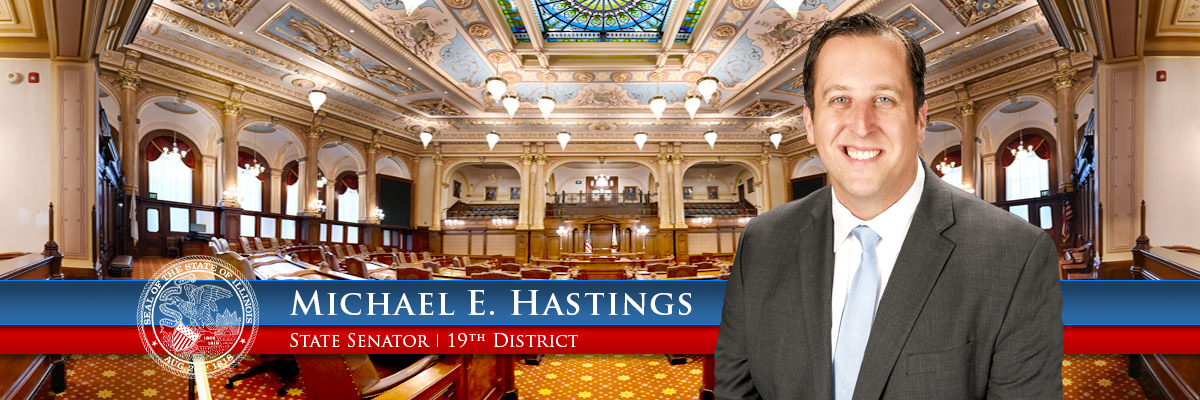
Climate Union Jobs Act puts union labor to work building Illinois’ clean energy economy
Frankfort — State Sen. Michael Hastings (D-Frankfort), chair of the Senate Energy and Public Utilities Committee, today announced legislation that would put hundreds of thousands of union laborers to work building a 100 percent clean energy economy in Illinois. The newly filed Climate Union Jobs Act (CUJA), which was crafted in partnership with labor coalition Climate Jobs Illinois (CJI), would create and save an estimated 280,000 jobs and provide over $150 million annually in rate relief to low-income families.
“We have outlined how Illinois can move forward with working people building our state’s clean energy future. We should turn this plan into action to solve some of our state’s biggest challenges today,” said State Sen. Hastings.
Joining State Sen. Hastings in sponsoring CUJA are State Sen. Sue Rezin, State Reps. Marcus Evans, Lawrence Walsh Jr., and Jay Hoffman. The measure broadly:
- Offers an additional $31 million per year in low-income assistance by expanding the Energy Assistance Act;
- Saves $67 million per year by doubling energy efficiency commitments for low-income households;
- Saves $30 million per year in clean transportation assistance for low-income consumers;
- Saves $23.5 million per a year for small businesses, non-profit and non-residential customers; and
- Expands eligibility for Percent of Income Payment Plan, limiting energy bills to no greater than a certain percentage of an individuals’ income.
“For decades, union men and women have built the infrastructure that powers Illinois’ future. We should put them to work again as the state sets out to build a clean energy economy. Passing this ambitious yet achievable legislation, we can lower unemployment, reduce emissions and close income inequality from Chicago to Cairo and Moline to Mahomet,” CJI Executive Director Joe Duffy said. “We look forward to working with Sen. Hastings, his colleagues in the General Assembly and other stakeholders during this session to enact legislation that will help build a cleaner, fairer state.”
Among the legislation’s many features, it would set robust union labor standards when Renewable Portfolio Standard, Carbon Mitigation and Solar for All credits are used. CUJA would require incorporating the:
- Illinois Prevailing Wage Act, requiring paying the going hourly rate for work of a similar character in a locality;
- Project Labor Agreements, setting the terms and conditions of employment for all craft workers;
- Stringent goals for apprenticeship programs;
- Mandatory reports on workforce diversity; and
- Labor neutrality agreements between an employer and an organizer where the employer agrees it won’t work for or against efforts to organize a union.
In addition, the legislation would create a just transition for communities economically reliant on fossil fuel generation and establish equity requirements for clean energy jobs by:
- Requiring Coal Plant Retirement Advisory Committee to report on employee and community impacts;
- Creating Empowerment Zones and tax incentives to spur investment in areas hit by plant closures;
- Creating a selection criteria so that new solar is distributed widely across the state prioritizing brownfield sites and disadvantaged communities;
- Providing $50 million over 10 years for job skills and training programs to build an equitable and inclusive workforce of the future;
- Investing $5 million into the Illinois Works program to support the recruitment of a diverse workforce into pre-apprenticeship training programs;
- Requiring renewable energy developers to report on their workforce diversity and develop an action plan if they do not meet necessary metrics; and
- Establishing a Displaced Energy Workers Bill of Rights that would provide:
- Advance notice of power plant or coal mine closure,
- Employment assistance and career services,
- Full-tuition scholarship for Illinois institutions and trade schools,
- Financial planning services, and
- 24 months of insurance coverage that costs no more than the average monthly premium paid by the worker over the last 12 months and offers the same level of benefits.
By advocating for bold clean energy investments with comprehensive labor standards, including prevailing wage, apprenticeship requirements, labor peace agreements, project labor agreements and responsible bidder requirements, Climate Jobs Illinois—which is independent of energy developers and utilities—is working to ensure these jobs create more pathways to the middle class, especially for communities disproportionately impacted by the COVID-19 pandemic and climate change.
Climate Jobs Illinois represents the hundreds of thousands of Illinois working men and women who are best suited to build Illinois’ new clean energy economy from the ground up. Executive Committee members of Climate Jobs Illinois are: Chicago Regional Council of Carpenters, Illinois Education Association, Illinois Federation of Teachers, International Association of Bridge, Structural, Ornamental and Reinforcing Iron Workers Union, the International Association of Heat and Frost Insulators and Allied Workers, International Brotherhood of Electrical Workers State Council, International Brotherhood of Electrical Workers Local 134, International Union of Operating Engineers Local 150, Laborers International Union of North America Great Lakes Region, Laborers International Union of North America Midwest Region, Service Employees International Union State Council and United Auto Workers Region 4.
Climate Jobs Illinois is a state affiliate of the Climate Jobs National Resource Center. CJI has partnered with The Project for Middle Class Renewal at UIUC, Illinois Economic Policy Institute and Cornell University Worker Institute.


